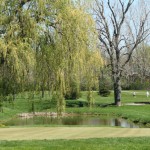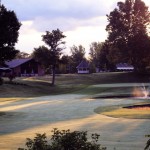Andrew Hickey is the New York State golf association tournament director, a position he has held since 2010. He sectioned out a piece of time recently to answer our questions on who he is, what he does and why he does it.
1. Give us the Andrew Hickey background detail on how you came to golf.
Like many golfers, my father introduced me to the game at an early age. His patience to teach the mechanics of the golf swing to a young boy with the attention span of a golden retriever soon reached its limit, so he wisely bought me a junior membership at a local course and turned me loose. I would spend my summers there practicing and playing with my best friend, and we both became pretty good players.
2. How’s your own game? Do you play much?
My golf game is respectable, but at times extremely inconsistent. Working in golf administration, the majority of your rounds are played early and late in the season, so it becomes difficult to maintain your game.
3. What are your duties at the NYSGA?
My duties at the NYSGA are wide- ranging. I am responsible for the administration, along with NYSGA Executive Director and our interns, of the New York State Amateur Championships and State Days Tournament Series. Some of the more important duties include site selection, budgeting and ordering of supplies, advertising and marketing, online registration maintenance and support, as well managing the on-site administration of these tournaments. This list can seem daunting, but with the support of our staff and talented volunteers we continue to build upon and improve our tournaments each year.
In addition to my tournament responsibilities, I am also becoming increasingly involved in the Rules of Golf and their education. We are finalizing the details of the NYSGA Rules of Golf blog, which will be used as a forum for discussion on the Rules as well as a medium by which I will be able to post articles regarding interesting Rules situations. As I continue to work towards becoming an expert in this area I expect that we will grow our Rules Education program as well. The NYSGA, in conjunction with the BDGA, RDGA and USGA, is currently offering four Rules of Golf Seminars in 2012. These seminars are of an introductory nature, with a purpose of providing information on the basic Rules and recent Rules changes.
4. Tell us how the State Days tournament series began.
The NYSGA’s State Days tournaments began in 2008 when Scott Gerbereux, the NYSGA Foundation and Membership Director, started the fledgling series. Scott recognized that although the NYSGA administers the New York State Amateur Championship, the organization didn’t offer any competitive tournaments for the majority of the golfers in New York state: mid-to-high handicappers. Thus the State Days were born.
5. Why should golfers who don’t compete in NYSGA Championship events participate in State Days?
I think there are two important factors driving players to compete in the NYSGA’s State Days tournaments, the first of which is the schedule. We have some spectacular golf courses scheduled to host State Days tournaments in 2012 (Transit Valley CC, Stafford CC, Irondequoit CC, Corning CC, Binghamton CC, Skaneateles CC, Seven Oaks GC, Mohawk GC, etc.), most of which are private clubs, accessible only to their members.
I believe the most important reason to participate in a State Days tournament is simply the ability to compete and test your game under the stresses of a competition. As these are individual stroke play tournaments (net and gross), players of all abilities have the chance to compete on an equitable basis, playing under the Rules of Golf where every stroke counts. It seems that the opportunity to play in these types of tournaments is shrinking, so we are happy to fill in the void.
6. Into what do you hope that State Days might evolve? Where do you see them in five or ten years?
I’m hoping to see the State Days continue and evolve to meet the needs of golfers in NYS. I think we are at a good position in 2012, with the tremendous schedule and finely tuned format, but I do see changes ahead for the State Days Tournament Series. Depending on staffing and scheduling restrictions, I would like to see more sites added to the schedule, especially on the weekend. The trend seems to be that more players are playing golf without any affiliation, and thus are able to travel and play more courses, which is great because New York has a wealth of quality public courses. With our strong bargaining position and our membership standing behind us, I think we can grow these events to include more quality public courses on prime dates (weekends). Hosting a State Days tournament is great for clubs as we have a tremendous marketing base, and even better for our members because of the discounted access we provide to these clubs.
7. What are the most gratifying elements to being a tournament director?
The most gratifying element to being a tournament director is the ability to see golf’s positive impact on those who embrace the game. There is no other sport in the world that demands such dedication, concentration, and integrity as the game of golf.
8. Have there ever been any negatives to conducting a tournament? Keep it anonymous.
The most difficult challenge has be to one that we encounter every year after a tournament’s entry closes. We carefully decide the time and date at which registration will close for each tournament, in order to properly prepare for the tournament’s successful administration. There are always those who procrastinate and forget to register before this specified time, and call our office to plead their case for special consideration. When told of our empathy and inability to accommodate their request, I am often berated for our inflexibility. It is never fun to have to tell a parent that their child can’t play in a tournament they love because of their mistake, but we must enforce our rules fairly and consistently.
9. What question haven’t we asked, that you would love to answer? Ask the question and answer it, please.
How did you come to a career in golf administration?
Graduating from Binghamton University in 2009 with a degree in Economic Policy Analysis, I figured on a job as an economic forecaster/analyst at some large financial company. But the housing market crash and subsequent recession limited the number of jobs in my field, so I found myself with the opportunity to pursue my passion for golf. With an extensive background working at golf courses, a career as a PGA professional was considered, although not for very long. My love for books, especially relating to golf history and architecture, is what ultimately led me to golf administration. As a present I was given the book Open, by John Feinstein, which chronicled the administration of the U.S. Open at Bethpage Black in 2002. I read about all the hard work it takes to pull off such a massive championship, and realized that there were some really interesting jobs in golf that I didn’t know existed. After some research into this career path, I learned of the USGA’s P.J. Boatwright, Jr. Internship program, and soon was hired by the NYSGA on a temporary basis, then as a full time staff member shortly thereafter. Not much good has come out of this recession, but I was very fortunate to find a job in this rewarding industry.









